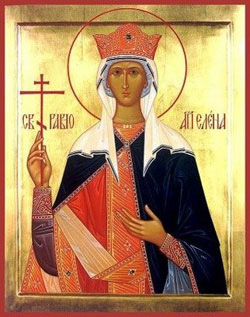Saint of the Day Online - St Constantine
Saint of the day online, Sunday, March 11, 2018
11-03-2018 St Constantine
St Constantine
St Constantine who was born on 227 AD, 27 February is known as Constantine I or Saint Constantine, in the Orthodox Church. He was a Roman Emperor of Illyrian origin from 306 to 337 AD. He was the son of Flavius Valerius Constantius, a Roman Army officer.
Constantine was sent east, where he rose through the ranks to become a military tribune under Emperors Diocletian and Galerius. In 305, Constantius raised himself to the rank of Augustus, senior western emperor, and Constantine was recalled west to campaign under his father in Britannia (Britain). Constantine was acclaimed as emperor by the army at Eboracum (modern-day York) after his father's death in 306 AD, and he emerged victorious in a series of civil wars against Emperors Maxentius and Licinius to become sole ruler of both west and east by 324 AD.
Constantine was the first Roman emperor to convert to Christianity. Although he lived most of his life as a pagan, he joined the Christian faith on his deathbed, being baptised by Eusebius of Nicomedia. He played an influential role in the proclamation of the Edict of Milan in 313, which declared religious tolerance for Christianity in the Roman empire. He called the First Council of Nicaea in 325 that produced the statement of Christian belief known as the Nicene Creed. The Church of the Holy Sepulchre was built on his orders at the purported site of Jesus' tomb in Jerusalem and became the holiest place in Christendom. The Papal claim to temporal power in the High Middle Ages was based on the supposed Donation of Constantine. He is venerated as a saint by the Eastern Orthodox and Catholic Church. He has historically been referred to as the "First Christian Emperor," and he did heavily promote the Christian Church. Some modern scholars, however, debate his beliefs and even his comprehension of the Christian faith itself.
His reputation flourished during the lifetime of his children and centuries after his reign. The medieval church upheld him as a paragon of virtue, while secular rulers invoked him as a prototype, a point of reference, and the symbol of imperial legitimacy and identity. Beginning with the Renaissance, there were more critical appraisals of his reign due to the rediscovery of anti-Constantinian sources. Trends in modern and recent scholarship have attempted to balance the extremes of previous scholarship.
In old age, on his way to Kintyre, he was attacked by pirates who cut off his right arm, and he bled to death. He is regarded as Scotland's first martyr. His feast day is March 11th.
© Copyright 2018 Grace Ministry Mangalore.